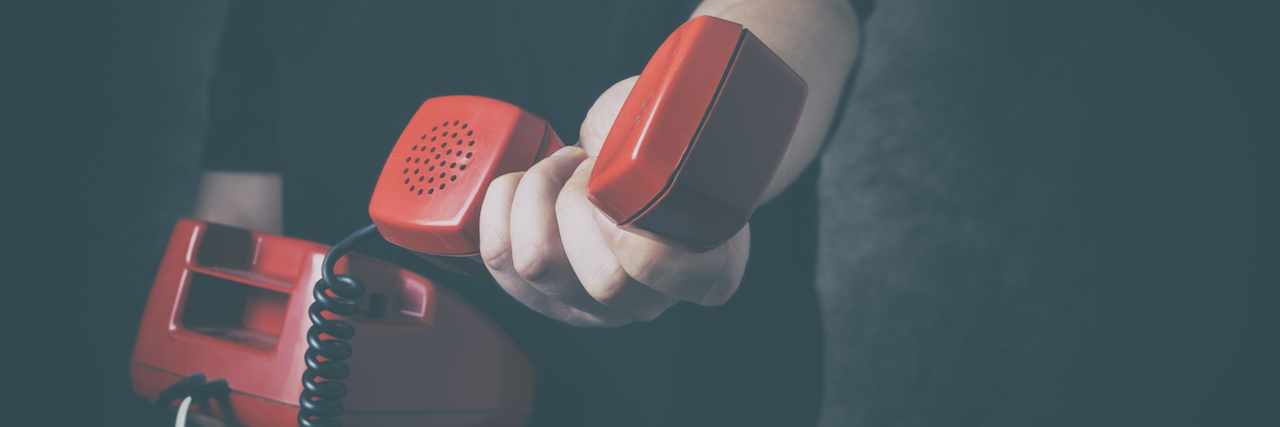The National Suicide Prevention Lifeline received a lot of attention in 2017. Calls to the suicide prevention service tripled after rapper Logic performed his song named after the Lifeline, “1-800-273-
On Saturday, Senator Orrin Hatch of Utah (R) took to the Senate floor to explain why this bipartisan proposal — called the National Suicide Hotline Improvement Act — would make it easier for Americans to get help when they’re experiencing suicidal thoughts. “Across our great nation, there are millions of people, especially young people, who are alone and suffering in the shadows of depression. Many of them are bombarded by suicidal thoughts and have no idea where to turn for help,” he said.
Hatch explained that the Lifeline number itself — 1-800-273-TALK — is not intuitive or easy to remember, especially for those experiencing a mental health emergency. He also shared an anecdote from a mother whose daughter tried to call her therapist but couldn’t get through the day she died by suicide. This new bill would create a three-digit suicide and mental health hotline — so one day, reaching a crisis counselor could be as easy as dialing 911.
The bill would also require the Federal Communications Commission (FCC) to study the current national suicide hotline system and make recommendations for how it could improve.
When the Lifeline was launched in 2005, it took about 20,000 crisis calls. In 2015, that number was 1.5 million calls. The Lifeline is composed of over 150 local- and state-funded crisis centers, run mostly by volunteers who go through a standardized training program.
“People want access to these lines. We have seen calls increase every year since they have been in operation, and this is an extraordinary time in which more people are reaching out for help, and we are very pleased with that because we know it works,” John Draper, the director of the National Suicide Prevention Lifeline, told CNN, “but it does come with some challenges.”
In many cases, the Lifeline saves lives. “I wanted to die,” Mighty contributor Taylor Ivie wrote of her experience calling the Lifeline, adding:
But you (the man who answered her call) talked me down and listened to me ramble for an hour. You reminded me of all I have to live for and how even though things suck right now, I will be OK again. You took me seriously. You didn’t sugarcoat things and you weren’t afraid of what I had to say. You helped me make a plan to stay safe. You laughed with me and cried with me. You gave me suggestions of things to watch on Netflix. You kept me alive. And I appreciate it.
To get some insight from real people who’ve used the Lifeline, we asked our mental health community to share one improvement they would suggest.
Here’s what they shared with us:
“There’s been times I felt rushed by the person on the other line. At such a sensitive time in someone’s life, they need to be more cautious about how they approach the ending of the call.” — Ashley B.
“A shorter, memorable code would be useful. [We need] proper training for those who answer, emphasizing empathy, compassion, sensitivity and patience. Knowledge of local resources to point to for help. It takes a multi-pronged approach.” — Yaitza C.
“I wish they didn’t put you in a ‘queue.’ Last time I called, I was 12th… I ended up having to call a more local number.” — Nancy D
“There is always room for improvement. One time, I was told that unless I was in immediate danger I should hang up. Felt like my situation wasn’t taken seriously.” — Rhonda M.
“When in crisis a person doesn’t know what resources to ask for or whom to follow up with, so [provide] that information without it needing to be asked for.” — Kristy Wright
“Sometimes talking is not enough… they should be able to connect people with agencies or resources that will actually help the problem that client is having directly. I have spoken to many agencies who claim to help but actually do nothing of the sort, and finding and dealing with agencies is not always easy for someone so depressed he can barely function.” — Ed B.
The legislation will be officially introduced on the Senate floor in May, CNN reported. And with the suicide rate the highest it’s been in 30 years — the issue, Hatch said, transcends party lines. “I ask all of you today — regardless of party affiliation — to co-sponsor this legislation,” he said. “In doing so, you can help us help those who need our help the most.”
The Mighty reached out to the National Suicide Prevention Lifeline for a comment but has not yet heard back.
If you or someone you know needs help, visit our suicide prevention resources page.
If you need support right now, call the National Suicide Prevention Lifeline at 1-800-273-8255, the Trevor Project at 1-866-488-7386 or reach the Crisis Text Line by texting “START” to 741741.
Getty image via natasaadzic

